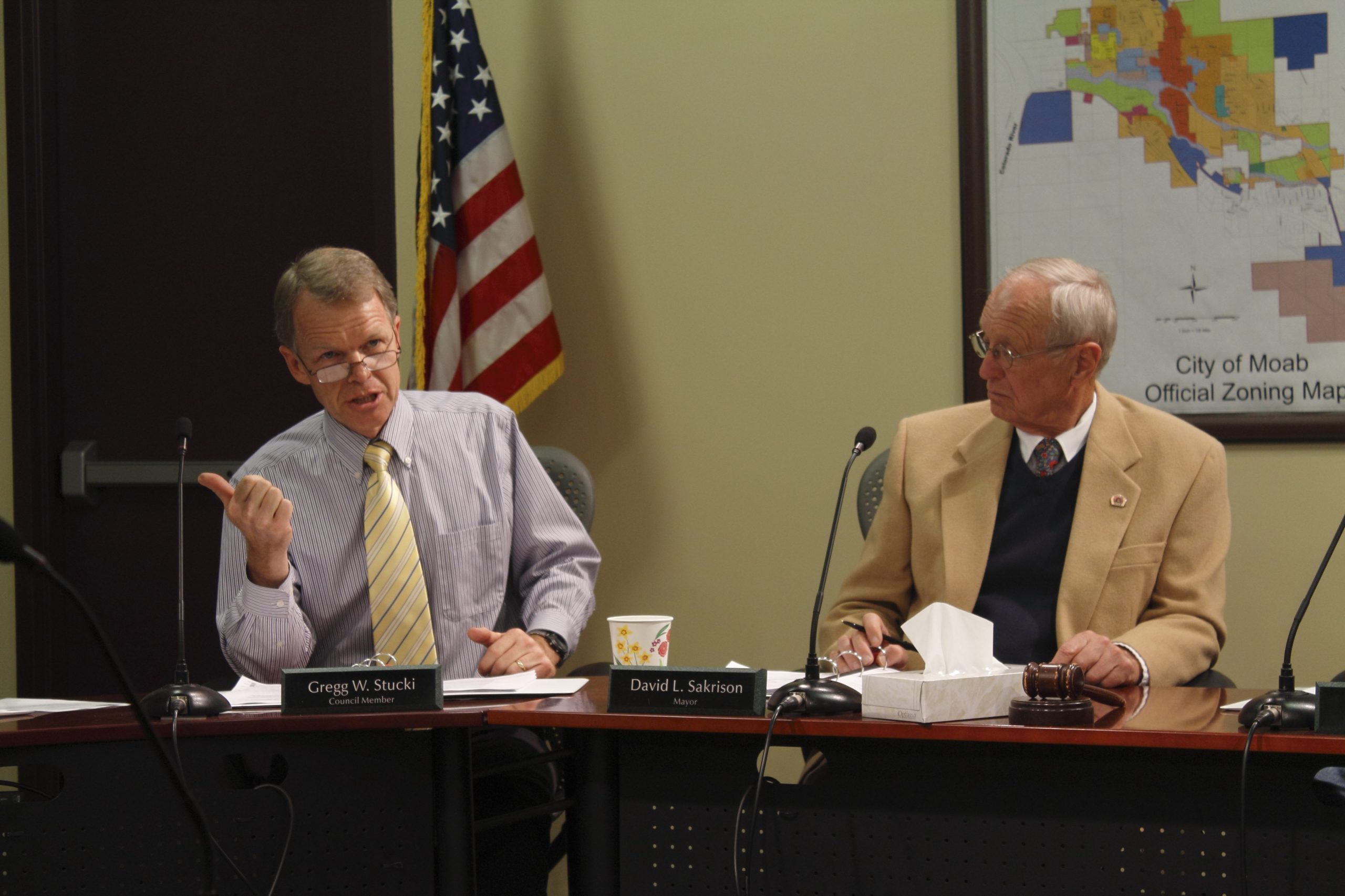Some information may be outdated.
The Moab City Council voted 4 to 1 to adopt an ordinance to legally recognize a variety of committed relationships through the establishment of a Mutual Commitment Registry at their council meeting Tuesday, Oct. 22.
Jenn Oestreich from Moab Pride originally presented the idea of the registry to the council at their meeting on Tuesday, Sept. 10.
People may sign up with the registry starting Nov. 22, said city manager Donna Metzler.
“A commitment registry recognizes relationships of mutual support and caring to support the financial welfare of one another,” Oestreich said at the Sept. 10 meeting. “It helps the elderly, committed couples who are not married and dependent adult children.”
Mutual Commitment Registries can be used as a tool by employers to determine eligibility for benefits from their company, allow for visitation rights at health care facilities and allow registered individuals to access city-owned and operated facilities in the same manner as a spouse or child.
“Half of the Fortune 500 companies offer benefits based on mutual commitment registries,” Oestreich said.
As directed by the council at the Sept. 10 meeting, city manager Donna Metzler and staff members researched Salt Lake City’s Mutual Commitment Registry, which was adopted in 2008. They drafted an ordinance that would specifically apply to the City of Moab.
“This is applicable to employers in the city,” Metzler said. During the council workshop held before the council meeting on Tuesday, Oct. 22 she clarified that employers are not required to recognize the commitment registry for benefits. “Employers can do whatever they want. It’s all voluntary.”
The ordinance states “employers may elect to provide health benefits and other benefits to people who are in relationships of mutual commitment but who are not married, such as adult dependents, people in same or opposite sex relationships, people in committed friendships or other types of familial relationships.”
Councilman Gregg Stucki was the only councilman to vote nay when the ordinance was passed.
During the discussion of the ordinance, Stucki said that he struggled with the idea that opposite-sex couples were included in the ordinance.
“While we are trying to help one group receive a benefit they don’t currently have, we end up undermining that commitment in another,” Stucki said.
He recognized that same-sex couples don’t have a legal avenue in Utah to show their commitment and to receive benefits that come with that commitment. However, opposite-sex relationships do, he said.
“They already have an option available for showing their commitment; it is called marriage,” he said. “By including them, and providing them with a lesser option, it turns this ordinance into a ‘partial’ or ‘semi-commitment’ registry.”
He emphasized that the concept of promoting greater commitment is good.
“We need more of it in society. A lack of commitment is the common denominator to many of the serious problems we deal with in society, such as divorce, infidelity, teen pregnancy and more, which have a devastating impact on children,” he said. “The last thing we should be doing is removing the incentives for opposite-sex couples to choose marriage.”
Stucki was the only councilmember to vote nay when the ordinance was passed.
In order to be eligible for the mutual commitment registry, two individuals must be 18 years of age or older and declare that they are solely and mutually committed to each other. They must also show at least three of the following documents: a joint loan or lease; a life insurance policy, retirement benefits account, or will of trust; a mutually granted power of attorney for purposes of health care or financial management; proof that one is authorized to sign for the other’s bank or credit account; a joint bank account; or sharing a primary residence.
The filing fee for a Declaration of Mutual Commitment is $25.
The ordinance states that to terminate the Declaration of Mutual Commitment either one party dies, or one or both of the parties executes a notice of termination by stating that one or more of the criteria used to declare commitment no longer applies.
A person cannot register for another Mutual Commitment until a previous Mutual Commitment has been terminated for at least six months, unless the commitment ended because of death.
Salt Lake City has had 94 couples register for Mutual Commitment since it became available in 2008. Forty-three of those were in the first year it became available.
“When we first started it we had a rush,” said Beverly Jones, a deputy recorder in Salt Lake City. “It was pretty constant through that first year.”
She said that the majority of the couples registered are same-sex, but there have been a few opposite-sex couples registered who were living together and wanted to be able be on one of the parties insurance.
“We haven’t seen a lot of elderly people, or those with adult children,” she said.
Since 2008 there have been seven terminations in Salt Lake.
“We don’t get a lot of terminations,” Jones said. “They come in one year and then about three years down the road and terminate.”
Appreciate the coverage? Help keep local news alive.
Chip in to support the Moab Sun News.





